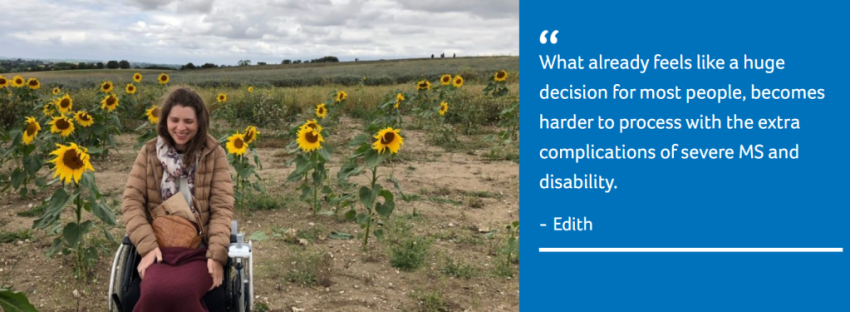The mid thirties baby bombardment is here, whether it’s the steady influx of friends/friends of friends/former school peers reproducing, or the targeted ads for maternity clothes and follow-on milk on my screens. I get that it feels like a huge decision for most people, but the extra complications of severe MS and disability are hard to process.
As a younger, healthier girl in my early twenties I kind of assumed that I would have children. After all, having grown up with parents and school holidays, that was my template. As a good friend explained to me, it’s harder to imagine a childless life when that’s not the environment we’ve known. But when I found myself single and needing to use a wheelchair in my late twenties, I reshaped my vision. It took a huge amount of grief for the whole way I’d planned to live, any ideas of family were just a part of that. With some years, therapy, and a course of antidepressants, I learned to live with the grief. But the current baby wave is turning out to be a separate brainteaser.

When I started taking Tysabri nine years ago, the guidance was clear: you should not conceive whilst taking MS drugs. The significant gap in MS treatment during trying for a baby and pregnancy was one of the main factors causing women to have such a dip in health. However I spoke with my former MS nurse a few weeks ago, and the guidance has now changed; subject to the prescribing neurologist, it is possible to receive Tysabri into pregnancy (I must have missed the announcement accompanying this pretty major change in advice). To keep things complicated though, JC positive ‘high risk’ patients like myself are now being moved onto Ocrevus. A year ago, when I thought I had no drug options, I would have jumped at the chance. But, you cannot conceive whilst on Ocrevus. I would love not to be tied to my hospital Tysabri infusions every four weeks, but the decision to move treatments is now much more loaded and tied to ‘the life decision’ of whether to have children.
There’s unfortunately no exact template for how my MS and life will be with or without children. My partner is also undecided, which I understand given the potential health consequences for me, although he would need to take on most of the physical aspects of childcare. I would love to have a conversation with my sixty year old self to advise me. I know the reality is there is no ‘right’ answer, but would having children in my severely disabled condition be impossibly hard for me, my partner, and the children themselves?! Equally, the only certainty I have is that my MS will continue to progress and deteriorate, so is it better to crack on? In a decade’s time would I regret being childless? I would never want a child to become my carer and look after me, but having a family unit does make my increasingly disabled future look less scary. And what about pregnancy when you’re as physically limited as I am? It would certainly be classed as high risk, but as that is my constant box, it loses effect; but does pregnancy in a disabled body increase the risk of other physical problems? Would a cesarean even be possible with my suprapubic catheter? Would I be able to receive increased social care to help? Most MS charities have guidance on pregnancy, but MS is so wide-ranging in symptoms and severity that it’s impossible to find specific answers. There is also the reality that my child would have a higher risk of having MS, about 1 in 50, and although MS treatments are constantly developing, I would hate to pass the illness on. And that’s not even thinking about how the fatigue of parenthood would affect my own health… is it possible to overthink such a decision?!
Friends who have gone through parenthood give the puzzling advice that it is both the hardest and best thing they’ve done, both extreme yet entirely subjective labels. Living with MS is hard, organising social care is hard, and I didn’t choose any of that. If I had a free choice I would probably be more wary of the limits children bring – no spontaneous trips or working around the world, but my life is already pretty restricted by disability. My neurologist gave me a few answers, but I could ponder the issue in circles for hours (and have done) and be left with a lot of unknowns. And of course, this could all prove irrelevant if my next JC virus count has risen significantly and I need to move treatments; as ever, all choices subject to MS.
This piece was published by the MS Trust here. I was largely interested in sharing it to hear others experiences/insights/wisdom!
Source: thinkindecimals.wordpress.com
